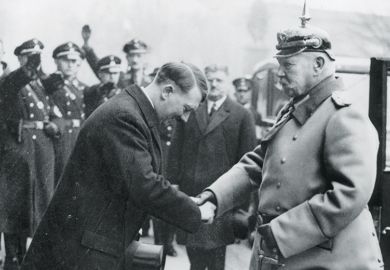I’ve never really liked “counterfactual” histories or fictions that explore paths not taken: dealing with the past is quite complex enough without making things up. But the detail, depth and seriousness of Catherine Gallagher’s Telling It Like It Wasn’t have changed my mind.
She notes the contemporary surge of interest in “What if…?” stories (think of Len Deighton’s 1978 novel SS-GB , televised last year by the BBC) and seeks to explore their origins and meaning. She distinguishes between counterfactual histories, usually short “thought experiments” that speculate on possibilities for polemical, pedagogical or other purposes; alternative histories, which explore a whole world (in which, say, the Nazis won the Second World War); and alternative-history novels – fictions that take place in those worlds (such as SS-GB ).
A sense of this book’s depth of thought and research comes from Gallagher’s astute and interdisciplinary analyses of the history of counterfactuals. Gottfried Wilhelm Leibniz, satirised in Voltaire’s Candide as Pangloss, is one source. After all, to believe we are living in the “best of all possible worlds” means imagining worse, less providential ones. But in contrast to such abstract metaphysics, the book argues that it is in the nuts-and-(gun)bolts of military history that this mode was most successfully paraded: wars “are full of unpredictable turning points” that make good teachable moments. Carl von Clausewitz speculates on what Napoleon should have done and Gallagher uncovers many other influential figures more or less unknown today.
Two major case studies form the core of the book: counterfactuals about the American Civil War and about the invasion and occupation of the UK by the Nazis. These eras obviously loom large in the cultural and historical imagination of both nations and are full of unresolved issues. We see this in the furious rows over, say, the statues of Confederate generals and the ways in which Brexit discourse turns to the Second World War to find arguments for both Leave and Remain.
In the British case, Gallagher points out that the counterfactuals explore the idea of national character (“a concept that no longer seems coherent to us and even those who used it during the war years admitted its semantic slipperiness” – would that those confidently proclaiming about “Britishness” today would admit the same). Some counterfactuals display a plucky stereotype; others, including Noël Coward’s 1946 play Peace in Our Time and SS-GB, reveal an incipient fascism within British culture. More generally, Gallagher’s theme brings usually disparate strands together. She analyses the celebrated attack on appeasement, Guilty Men (1940), as well as Churchill’s speeches as counterfactuals, and shows their polemical power. She looks at the many alternative histories of invasion (which abound, despite the unfeasibility of the Nazis’ Operation Sea Lion) and the fictions based on a Nazi occupation. This is a bravura piece of work and should be read by scholars of the period in literature and history.
After her outstanding analyses, I wish that Gallagher had explored in more detail the reasons for this surge of interest. The use of fiction, memory and history are clearly central to the new “culture war”, and an interest in imagining how things weren’t forms a powerful weapon within it.
Robert Eaglestone is professor of contemporary literature and thought at Royal Holloway, University of London. His most recent book is The Broken Voice: Reading Post-Holocaust Literature (2017).
Telling It Like It Wasn’t: The Counterfactual Imagination in History and Fiction
By Catherine Gallagher
Chicago University Press
416pp, £79.00 and £26.50
ISBN 9780226512389 and 9780226512419
Published 22 January 2018
POSTSCRIPT:
Print headline: What’s the alternative?
Register to continue
Why register?
- Registration is free and only takes a moment
- Once registered, you can read 3 articles a month
- Sign up for our newsletter
Subscribe
Or subscribe for unlimited access to:
- Unlimited access to news, views, insights & reviews
- Digital editions
- Digital access to THE’s university and college rankings analysis
Already registered or a current subscriber?






